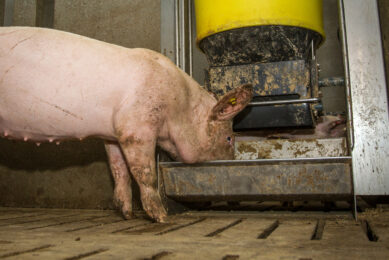Energy: main earner for pig farmers?

Energy could be the prime earner for pig farmers, and pigmeat production — in financial terms — might simply become a by-product, Martin Barker, managing director of Midland Pig Producers, told a producer conference organised by pig breeding company ACMC last week at Beeford, near Driffield, Yorkshire.
With the world focus on renewable energy, he saw the system of biogas production – converting pig manure into methane and then electricity — as a competitive way forward.
His company is developing a “Green circle pig production concept” in which the manure from 52,000 finishing pigs will be used to generate £1m (€1.3m) worth of electricity annually. A 3 MW bio-gas plant is being built in Staffordshire and this will also process ‘kitchen’ waste, which would otherwise go to landfill. In addition, the waste processing will generate income since landfill disposal fees for this amount to around £65 (€85) per tonne.
When the waste is processed an odourless liquid is produced, a valuable fertiliser. Midland Pig Producers (MPP) is currently arranging agreements with local farmers whereby they are supplied with free seed and fertiliser and in return sell grain to MPP at prices reflecting the value of the inputs. The fertiliser should be sufficient for 2,000 ha of arable land producing enough grain for 15,000 tonnes of pig feed.
Pig farming survival
“Pig farmers survival might depend on energy production and such a system could make pig farming profitable again,” said Mr Barker.
He pointed out that most of UK land is now a NVZ (Nitrate Vulnerable Zone) and many farms have IPPC regulations to contend with. Converting feed into meat produces a by-product which is about 70% nitrate. Importing feed and nitrogen fertiliser increases this burden. Oilseed rape production, for instance, requires 150% more nitrogen than barley, so utilising home-grown feed for pigs with home-produced fertiliser made environmental sense.
The bio-digester would produce heat for piggeries as well as cheap electricity for milling the grain. In addition to reducing nitrates grain produced within the Green Circle’ concept would cut food miles, further reducing the carbon footprint.
Adapt to high feed prices
With the supply of commodities struggling to keep up with demand, high and volatile raw material prices are likely to remain in the foreseeable future, so pig farmers would need to adapt to live with them.
“Grain stocks are at an historical low, and there are no easy answers,” Hugh Burton, raw material manager for Associated British Nutrition, warned producers.
He said that the good news was that there would be a greater availability of co-products on the market from the biofuel sector, both wet and dry. It could mean that the farm feeding practices would have to change to benefit from these materials. For example, increased bio-ethanol production would result in greater availability of distillers’ grains. Traditionally these entered the ruminant feed market, but there could be opportunities for mono-gastrics, such as pigs.
Bio-diesel production from soya and oilseed rape is likely to result in more oilseed meals, which have a high protein content, on the market. This process would also result in the production of glycerol, traditionally used in human food and cosmetics. However, it was a good ingredient to incorporate in pig feed.
Compounders would be able to incorporate these ingredients in diets, but home mixers would definitely need nutritional advice, suggested Mr Burton.
He explained that while these ingredients would not be cheap, they would be relatively cheap in relation to cereals.
Mr Burton said that ABN’s own role was changing from a company just selling feed to one providing a wider service through its ability to deal with the intricacies of the raw materials market, incorporate these co-products correctly and explain their use to producers.











